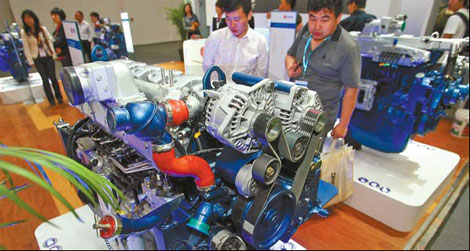Uses up to 30 percent less fuel and emits 25 percent less carbon dioxide
Over the past 20 years, the global energy crisis and environmental problems have prompted the auto industry to develop cleaner, more ecologically friendly and energy-saving products.
As a result good progress has been made in technical innovations of the diesel engine. Innovative diesel technology has big advantages in terms of economy, cleanliness and driving comfort.
Bosch Group, a leading global supplier of technology and services in the automobile industry, believes that promoting diesel engines in passenger cars will benefit the low-carbon movement and expedite energy-conservation and emission-reduction goals during the 12th Five-Year Plan period (2011-2015).
The German group has just kicked off the first and also the largest nationwide tour focused on clean diesel technology in China. Under the slogan “Experience Clean Diesel Now”, the tour will cover around 20 cities in six months in the first round and will provide a lively opportunity to get insights into clean diesel technology and its economical, social and environmental benefits in terms of energy saving and emission reduction.
“China is the largest fast-growing auto market in the world, with a huge demand for mobility. The Chinese government has set clear targets for energy saving and emission reduction,” said Stephan Hoelzl, general manager of Bosch Automotive Diesel Systems Co Ltd, Bosch Group’s diesel venture in Wuxi, Jiangsu province.
“Clean diesel technology, which has already proven its maturity in many different markets, is a practical and immediately available solution for the sustainable growth of mobility in China. With a higher share of diesel cars on Chinese roads, a much bigger contribution to the reduction of emissions and fuel consumption could be made,” he added.
Around the world, the agreed target for carbon dioxide emissions is getting more and more stringent: the European Union has set the goal of reducing emissions to 95 grams a kilometer by 2020, while China pointed out the importance of automotive energy saving and emission reduction in the 12th Five-Year Plan, and emphasized the development and promotion of energy-saving vehicles as well as new-energy vehicles.
“Chinese consumers are also paying more attention to energy-saving and environmentally friendly performance when they are purchasing cars,” said Hoelzl. Via the Clean Diesel Tour, Bosch aims to establish diesel as an option for clean transportation using a worldwide proven technology.
“Although we agree that the electric vehicle is one of the best ways to solve the challenges of the future, a diesel engine is the most feasible and efficient solution in the current situation among existing energy mixtures,” he added.
Bosch is striving to further develop diesel technology and has been associated with every important innovation regarding the fuel. According to Hoelzl, compared with a gasoline car, a diesel vehicle equipped with advanced Bosch technology uses up to 30 percent less fuel and emits 25 percent less carbon dioxide while achieving a 50 percent higher torque at the same time.
“With such an environmentally friendly performance, clean diesel technology contributes to the realization of energy-saving and emission-reduction goals, especially in the passenger vehicle segment,” said Hoelzl.
In the second half of 2011, the number of China’s car owners exceeded 100 million, surpassing Japan to become No 2 in the world. This figure is expected to reach 150 million to 200 million by 2020, of which nearly 95 percent will own cars with a traditional internal combustion engine, according to official statistics.
In China, fewer than 1 percent of cars are powered by diesel in comparison with the 52 percent of newly registered vehicles in western Europe in the first half of 2011.
“The popularization of clean diesel technology will make immeasurable contributions to the low-carbon development of the auto industry. Based on the current auto population, if clean diesel cars are increased by 1 percent, 180 million liters of fuel can be saved every year, reducing carbon dioxide emissions by 400,000 tons,” said Hoelzl. “If the tremendous potential of China’s diesel car market is tapped, clean diesel technology will contribute more toward the nation realizing its goal of energy conservation and emission reduction.”
Bosch’s Clean Diesel Tour contains two major parts: the mobile exhibition and an “experience” tour.
The former will feature clean diesel technology on show at automobile manufacturers, universities and other organizations in different cities along the route. It will include displays on the history of diesel, the latest diesel technology and future developments.
In the experience tour, a fleet of four domestic diesel sports utility vehicles will be driven around 30,000 kilometers over the next six months, challenging different climate and road conditions in China. The car drivers will report data such as fuel consumption and mileage back to the exhibition center.
Read more . . .
Bookmark this page for “diesel innovation” and check back regularly as these articles update on a very frequent basis. The view is set to “news”. Try clicking on “video” and “2” for more articles.








